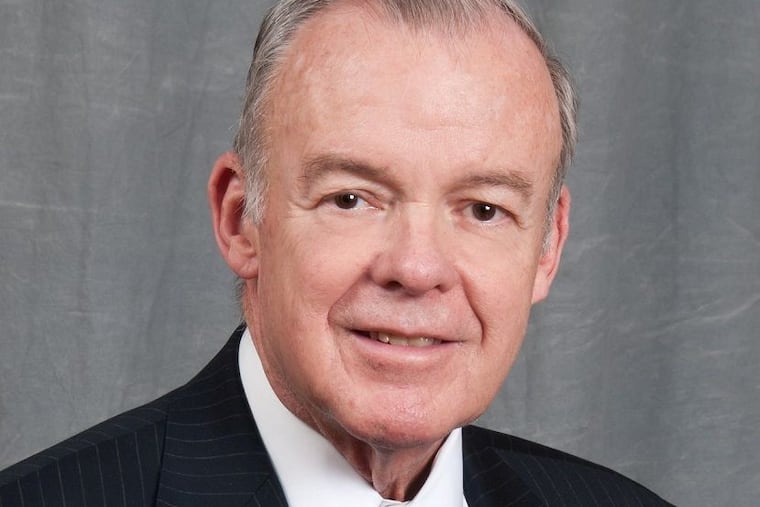Lawrence T. Hoyle Jr., Philadelphia legal legend and corruption fighter, dies at 81
A native of North Carolina, he played a key role in Philadelphia during the 1970s and '80s.

In the summer of 1968, Philadelphia lawyer Lawrence T. Hoyle Jr. traveled to Mississippi to volunteer his legal services for the civil rights movement.
As Dennis Suplee, Mr. Hoyle’s longtime friend and legal colleague, tells it, the young Philadelphian found himself taking the deposition of a superintendent from the notorious Parchman Farm prison in the Delta. Mr. Hoyle was representing African American marchers who had been locked up and then forced to drink large doses of laxative, “with predictable dehumanizing results.”
A lawyer from the Mississippi Attorney General’s Office representing the superintendent unholstered a revolver and placed it on the table with the barrel facing Mr. Hoyle and announced, “Now I’m ready to proceed."
A lifelong hunter and Marine Corps veteran, Mr. Hoyle could see a bullet in each chamber, but he continued doing his job. He directed the court reporter to swear in the witness and described for the record what had just happened. He then took a pen from his pocket and turned the barrel away from everybody. “Now I’m ready to proceed,” Hoyle said, as he later recounted to Suplee.
Mr. Hoyle was “the gutsiest lawyer I’ve ever met,” Suplee said in a written account of the episode and reiterated in a telephone interview Friday night.
On Jan. 8 at 4 p.m., there will be a memorial service at the Racquet Club of Philadelphia for Mr. Hoyle, 81, who died Nov. 30 at his home in Center City after a lengthy battle with Parkinson’s disease.
After he returned from Mississippi, Mr. Hoyle’s pursuit of justice led him on a sometimes frightening journey through Philadelphia corruption.
In 1972, he was appointed by Gov. Milton Shapp to be the executive director of the Pennsylvania Crime Commission. For the next two years, Mr. Hoyle led an investigation of malfeasance in Mayor Frank Rizzo’s police department, which the commission finally declared in a 1974 report was “ongoing, widespread, systematic, and occurring at all levels.”
After the report was made public, Mr. Hoyle’s family home was repeatedly “paint-bombed,” with unknown culprits catapulting large cans of paint through his windows in the middle of the night.
In 1986, Mr. Hoyle represented Willard G. Rouse III, developer of the One Liberty Place skyscraper, when Rouse was the target of a $1 million extortion plot attempted by City Councilman Leland M. Beloff and mob boss Nicodemo Scarfo. The day Rouse was confronted with the shakedown, he turned to Mr. Hoyle, who counseled him to go to the federal authorities. Later that month, Beloff was arrested by the FBI, and eventually convicted and sentenced to prison.
Mr. Hoyle also served as a member of the Judicial Inquiry and Review Board that investigated the so-called roofers scandal in which Philadelphia judges received cash gifts from union leaders.
“Larry was an attorney of unchallenged integrity, respected by everyone,” former Gov. Edward G. Rendell said in a statement.
Mr. Hoyle was born and raised in Greensboro, N.C. He earned an undergraduate degree from Duke University, joined the Marines, then studied law at the University of Chicago. He started his professional legal career in 1965 at Schnader Harrison Segal & Lewis. In the 1980s, he started his own firm. He returned to Schnader in 2012.
He served on the board of directors of the Public Interest Law Center in Philadelphia, including one term as president. Michael Churchill, a longtime attorney at the nonprofit center, said in a statement: “Larry was not only a distinguished lawyer, he was also a passionate believer in equal rights and racial justice.”
Arlene Fickler, who practiced law with Mr. Hoyle for more than four decades, said in a statement: “Larry was not only a tenacious advocate for his clients, but also an irreplaceable partner, mentor, and friend — dedicated to bringing out the best in his younger colleagues and yet so proud when those lawyers were themselves recognized as excellent attorneys.”
Suplee described Mr. Hoyle as very intense when it came to his work, but completely relaxed in social situations, becoming "the best possible companion.”
Mr. Hoyle was a member of the Racquet Club of Philadelphia for nearly 50 years. He was a board member of the Blooming Grove Hunting & Fishing Club in Hawley, Pa.
He also owned a farm on the eastern shore of Maryland.
Mr. Hoyle is survived by his wife, Molly, son Eric, daughter Alison Wallis, a brother, stepson, and five grandchildren.
There will be a reception following the memorial service on Jan. 8. at the Racquet Club of Philadelphia, at 215 S. 16th St.
Donations in his memory can be made to the Public Interest Law Center, Two Penn Center, 1500 JFK Blvd., Suite 802, Philadelphia, Pa. 19102.